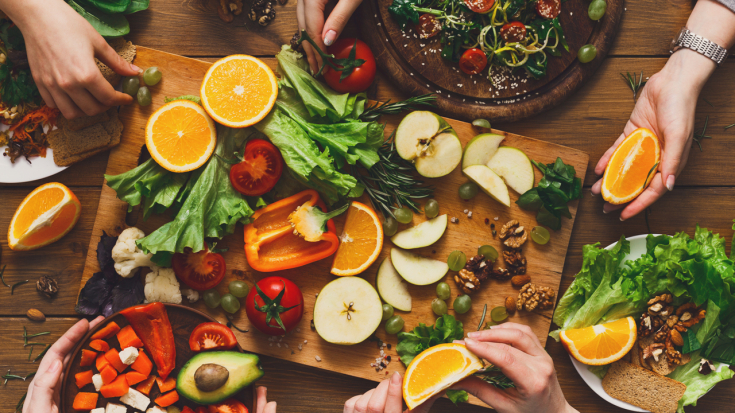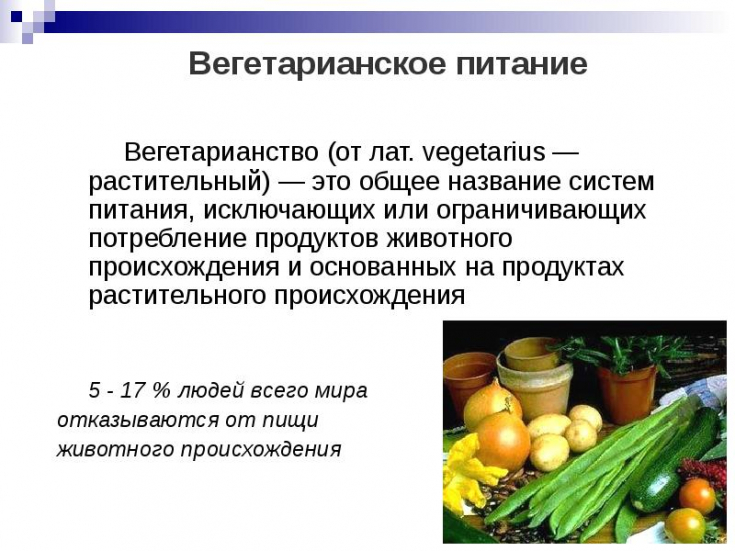Leather − it is not only the outer covering of the human body, it is one of the largest organs of the human body (together with subcutaneous tissue makes up 16-17% of the total body weight), which performs a number of vital functions. Many dermatologists say that nutrition is of great importance for the condition of the skin: what goes inside, will definitely be outside.
Find out in the article on estet-portal.com what changes occur in the skin with vegetarianism.
- What determines the condition and normal functioning of the skin
- The most common types of vegetarianism
- Effect of vegetarianism on skin condition
What determines the condition and normal functioning of the skin
Normal unaltered healthy skin protects the human body from exposure to chemical irritants, pathogens of infectious diseases (fungi, pyogenic microorganisms, viruses, etc.), has electrical resistance, provides photoprotection, and also performs the following functions: sensitive, thermoregulatory, respiratory, secretory, resorptive, metabolic, depositing, excretory, participation in immune defense, etc., which is due to the structure and chemical composition of the various layers of the skin, among which structural proteins play an important role − collagen, elastin, reticulin, keratin, etc.
Follow our page on Instagram!
#opros#
The peculiarity of the skin is also that it is constantly renewed, regenerated, which generally implies a high level of metabolic and energy processes and a constant supply of chemicals into the skin, which are the structural components of the skin layers and the source of energy processes.
The condition and normal functioning of the skin depends on a number of exogenous and endogenous factors, among which a rational balanced diet with a sufficient amount of vital proteins, lipids, carbohydrates, microelements and vitamins is important.
The most common types of vegetarianism
At the same time, there is a part of people who adhere to a special type of diet − vegetarianism, which excludes the use of animal products. Proponents of vegetarianism believe that natural foods for humans are plant products that benefit the body, but not all vegetarians refuse milk and seafood − it all depends on the type of vegetarianism they follow.
Follow us on Facebook!
There are 4 common types of vegetarianism:
1) Vegan – this type of vegetarianism uses products of exclusively plant origin, complete exclusion from the diet of fish, meat, eggs, honey and dairy products;

2) Lacto-vegetarian − this is a type of vegetarianism in which the consumption of dairy products and milk, as well as honey;
3) Ovo vegetarian − type of diet in which milk and dairy products are not consumed, but eggs are allowed;
4) Lacto-ovo vegetarian − a type of vegetarianism in which the consumption of honey, eggs and milk is allowed.
All types of vegetarianism are allowed to use all methods of food preparation, including heat cooking; this is the fundamental difference between vegetarianism and vitarianism – raw food diet.
Effect of vegetarianism on skin condition
It has been proven that although vegetarianism provides for sufficient consumption of plant foods enriched with vitamins and microelements (vegetables, fruits), however, the daily amount of their consumption cannot provide the body's physiological need for vital protein components, including essential amino acids that are in meat products.

It should be noted that collagen, which is the main structural component of the skin − it is an animal protein that is not found in plant foods. It has also been found that vegetable proteins are digested much worse than animals: black bread protein is digested by 48-70%, potatoes - by 60-68%, buckwheat - by 60-70%, millet - by 50%, while proteins of meat, fish, eggs and milk are absorbed by almost 98%.
Changes in the condition of the sebaceous glands during menopause
At the same time, data on the negative impact of vegetarianism, especially veganism, on the functional state of internal organs and systems (nervous, endocrine, musculoskeletal, immune, cardiovascular systems, as well as vision, etc.) indicate why these foods are contraindicated in children, adolescents, pregnant women and lactating mothers.
Therefore, according to modern nutritionists, a full-fledged diet, in addition to plant foods, must necessarily include dairy and meat products, fish and eggs, which provide the human body with essential nutrients: proteins, calcium, iron, vitamins B12 and D, and the like.

According to clinical observations, insufficient intake of these substances negatively affects the condition of the skin and its appendages, which leads to the following changes in their condition and functions: the appearance of dryness and flaking of the skin; decrease in turgor and skin elasticity; decrease in the barrier functions of the skin; suppression of the regenerative properties of the skin and mucous membranes; development of cheilitis; decreased local immunity, development of fungal (dermatomycosis) and pustular skin diseases (pyoderma); changes in the type and structure of hair (dullness, brittleness); & nbsp; the appearance of dystrophic changes in the nails (onychodystrophy) and an increased risk of fungal infection of the nails (onychomycosis); premature aging of the skin due to a lack of regenerative properties of the skin, directly related to the supply of nutrients.
You should also take into account the negative impact of vegetarianism, especially veganism, on the functional state of internal organs and systems − nervous, endocrine, immune, etc., which, in turn, indirectly worsens the condition and functions of the skin.
Therefore, to ensure the normal condition of the skin, it is important to have a rational balanced diet with the use of both vegetable and meat and dairy products, fish and eggs, which contain vital proteins, trace elements and vitamins necessary to ensure the full functioning of the human skin.
More interesting stuff on our YouTube channel:
Можете ли вы отказаться от мяса?







Add a comment